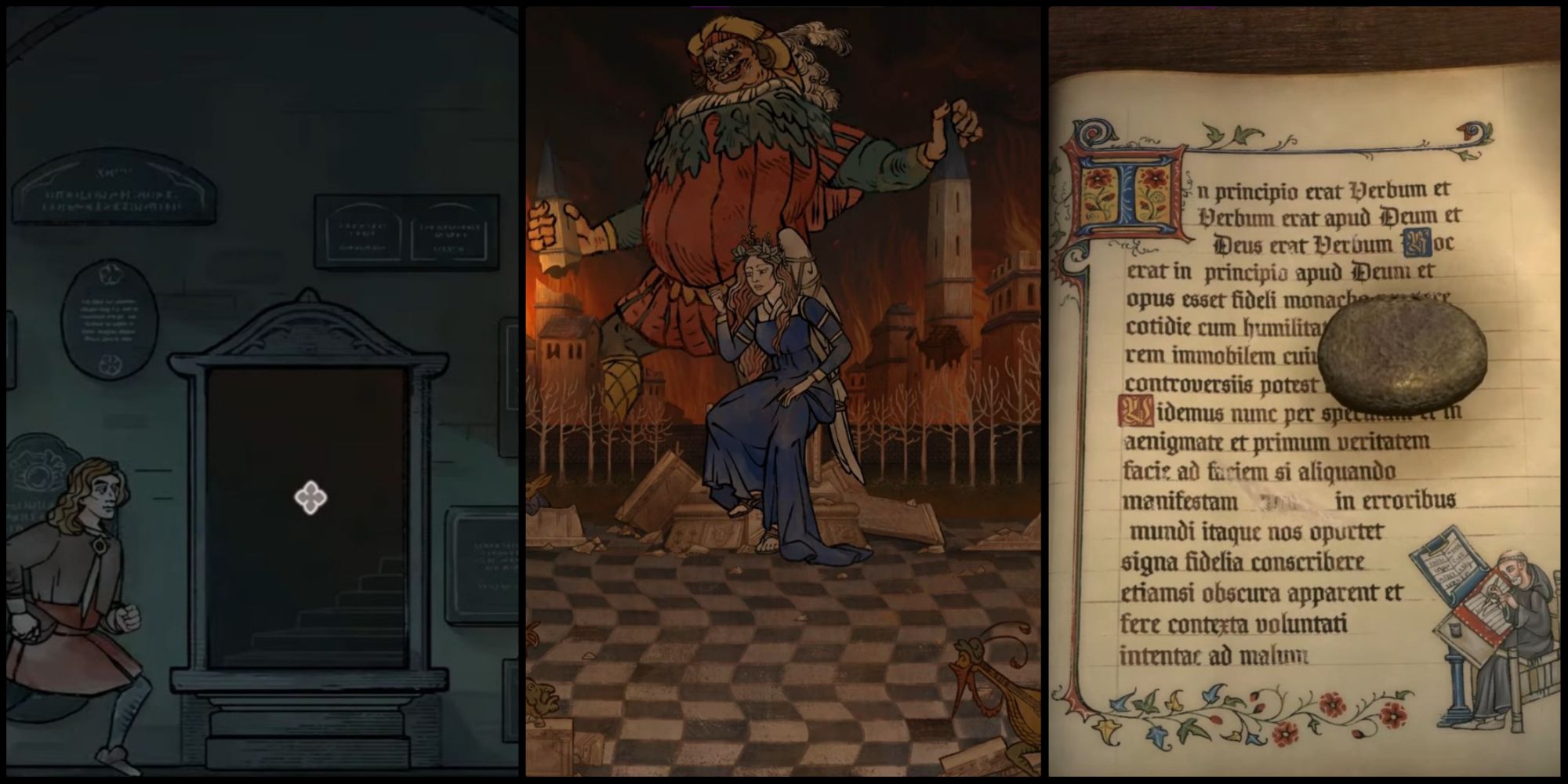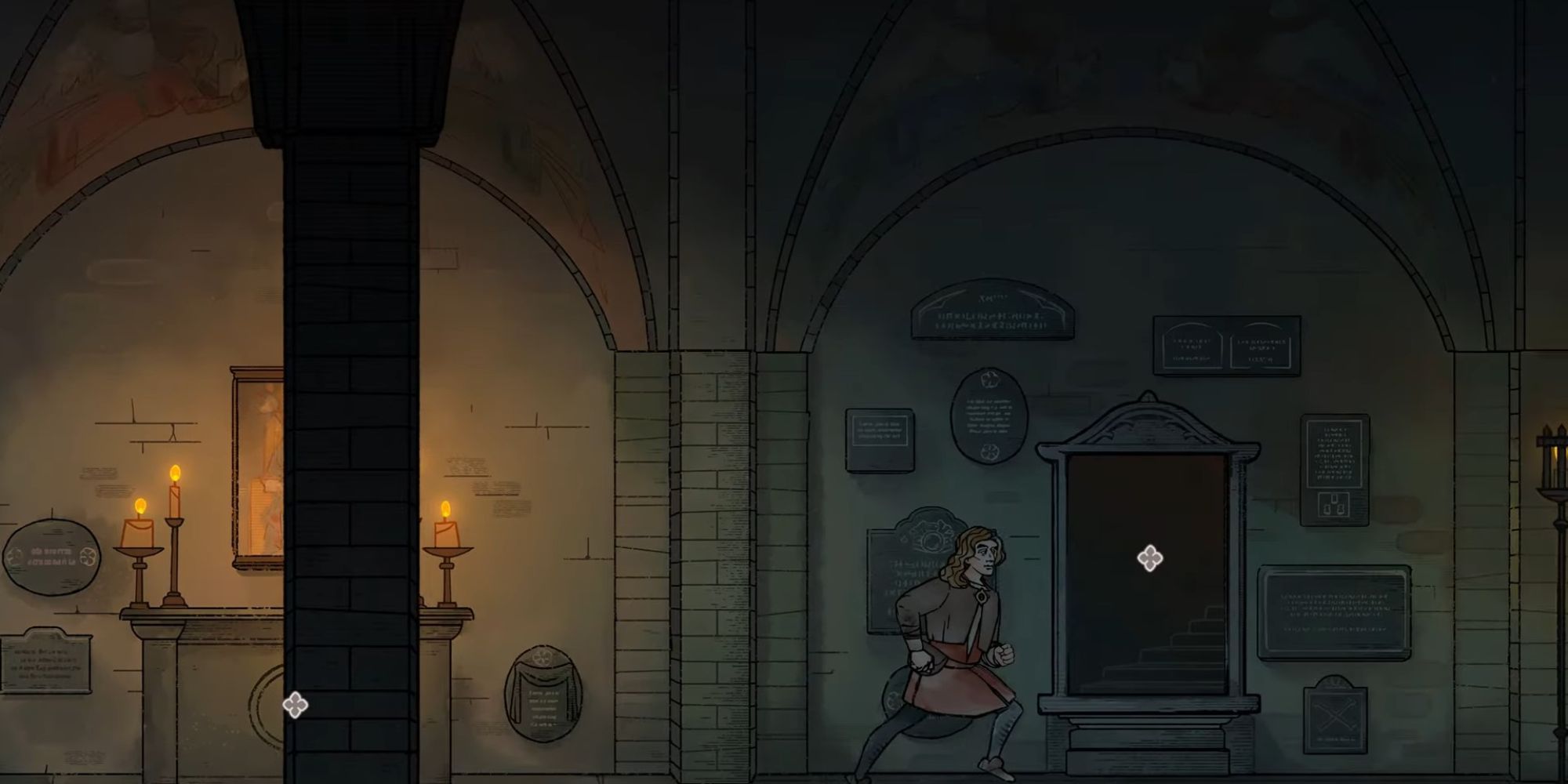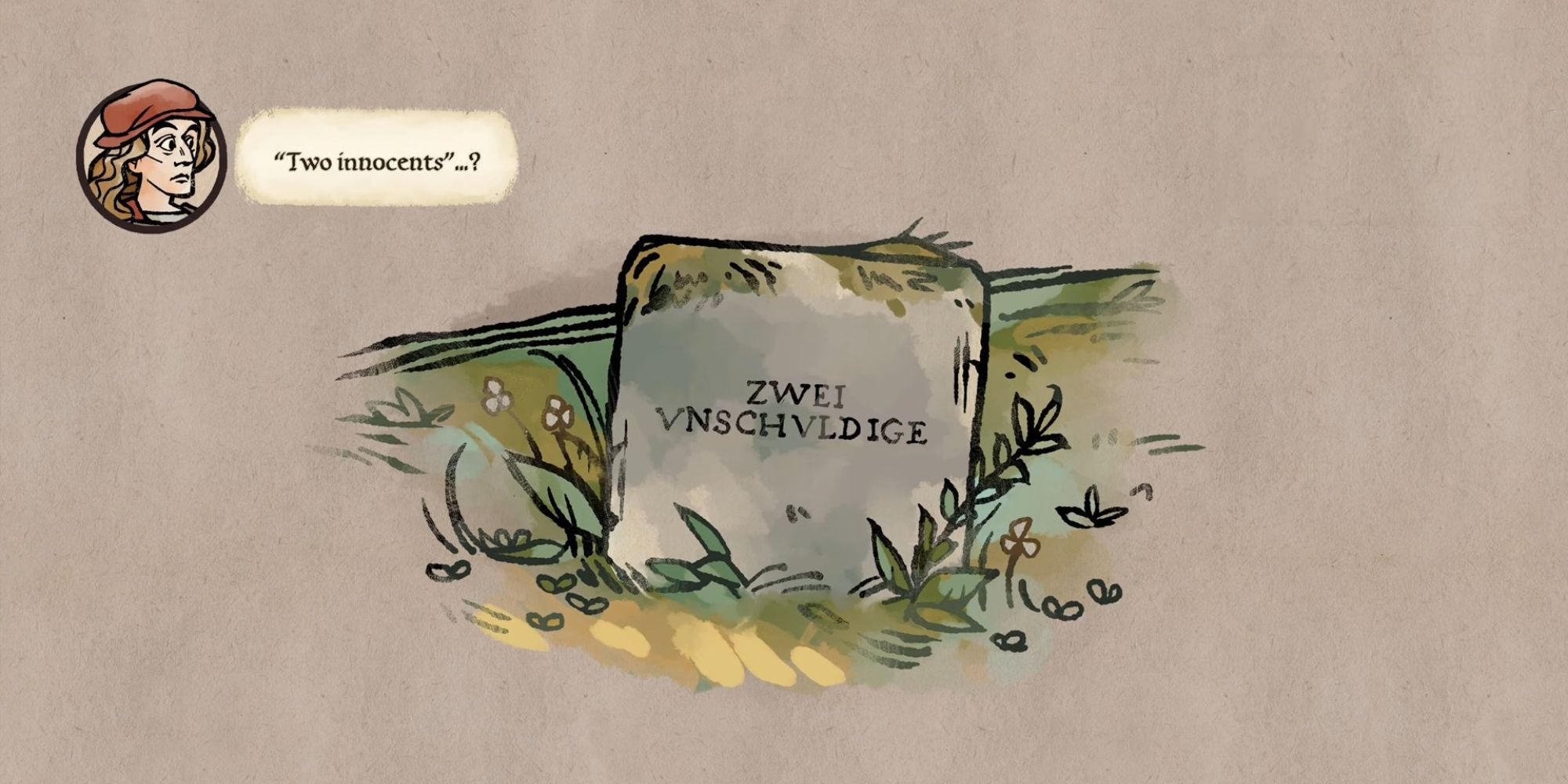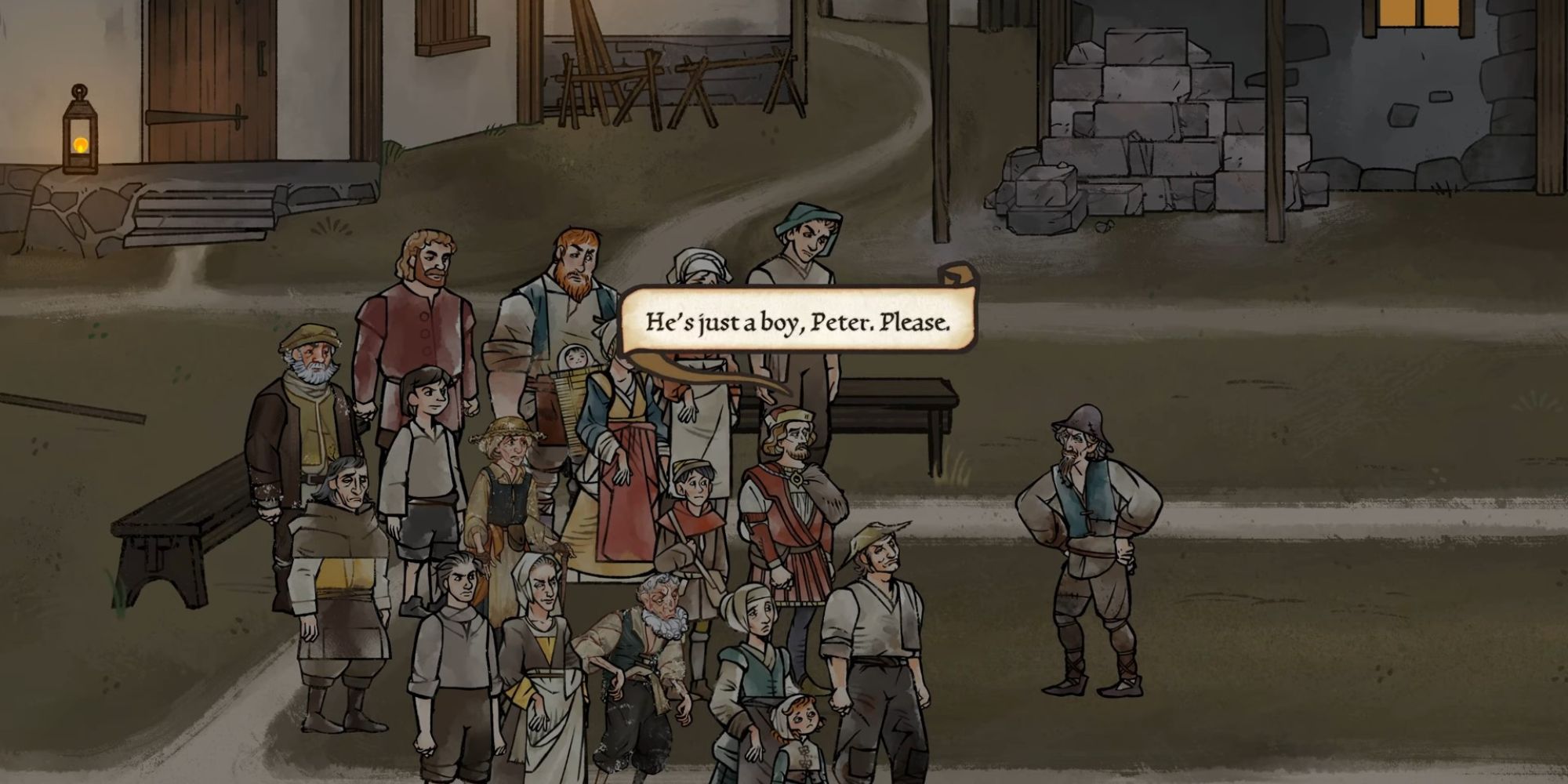Obsidian’s murder mystery historical drama Pentiment has its fair share of secrets, as anyone who’s played the game will know. Not only that but the game is structured in such a way that makes it impossible to uncover even half of its most plain secrets. While every player will eventually make it to the end and discover the identity of the String‑puller, no one can afford the time to dine with every family in Tassing, uncovering their past.
Like any good story, Pentiment hides its best secrets in plain sight, planting it in its own name or going so far as to cover the whole screen with it, but using a language that players are unlikely to know. Still, most secrets are far more quaint, dealing with the dark past of the town, a past that the mastermind is trying to unearth to cause chaos and mischief.
Warning: Spoilers Ahead
7 Finding The Secret Passage To The Library
Gaining access to the library during the first act of Pentiment isn’t a very difficult task, but it’s likely that many players didn’t find out they could do that because of a lack of time. While the monks lead the scriptorium, the nuns run the library, and they have their own secret ways of getting in and out, but why does the abbey have a secret passage leading into the library?
The real secret is that the web of hidden passages precedes the construction of the abbey, being originally designed for the Roman fort where the abbey was built. In the lowest level of the abbey, the crypt, players will find a suspicious sculpture holding a key. Clicking on that key will reveal the secret passage to the library.
6 Prior Ferenc, Baron Lorenz, And The Occult
Lots of players seem to have doubts about Prior Ferenc and many choose to follow his side quest. But even if many suspect him, not everyone knows his full story. Prior Ferenc has a peculiar hobby in common with Lorenz, one especially inconvenient for a priest to have: the occult. Yet when the baron asked him to attempt a ritual to rid him of his disease, the prior refused.
Further investigation will reveal a set of arcane tools hidden in a grave in the abbey’s cemetery. While some players may believe that Ferenc killed Lorenz in an attempt to silence him, this could also just be Ferenc protecting himself against the blackmail attempts of Lorenz.
5 A Grave For Two Innocents
Among the secrets related to the murder of Baron Lorenz, this is the most well‑hidden. It’s what gives Lucky, the town’s carpenter, a reason to hate Lorenz, though it doesn’t really explain how he could have done it or with what weapon.
If players choose to follow him around town, Lucky can be seen placing a flower in a grave far away from the others, in the middle of the forest. The grave only reads “two innocents.” If asked gently after dinner, Lucky’s wife will recount the story of how Baron Lorenz slept with their daughter a few years prior. The girl became pregnant and tried to induce an abortion by drinking an excessive dose of a drug, but died in the process.
4 Caspar Doesn’t Have To Die
Caspar is Andreas’ disciple and assistant, a child from Salzburg recruited at some point between Acts 1 and 2. It doesn’t take much to impress Caspar, as a certain test towards the end of the second act proves: here the game recounts all the moments in which Andreas might have been forgiving or severe, kind or mean-spirited against his apprentice, and uses it to decide whether he listens to his master’s words or not.
The twist is that the favorable outcome, Caspar listening to Andreas and leaving the town before the revolt happens, only comes if the boy has no reason to care for him. If the player was anything other than terrible to Caspar, he will disobey Andreas’ words and secretly remain by his side, sacrificing himself to save him from the flames of the abbey.
3 Martin Isn’t Martin Anymore
Another well‑hidden secret is that of Martin’s new identity. The man doesn’t seem to remember much about his past in the town during Act 1 before he runs away to live as a brigand. He doesn’t even remember Andreas or what he said to him as a kid, passing him as he ran away from the village. What’s even weirder, he seems to have lost a scar or two.
Keen players might not need further investigation to realize that Martin is hiding something, or rather, someone. Asking his family and other people around town will lead to a confrontation with the man, who reveals that he isn’t Martin after all. At this point, he already told Andreas the story of how his friend during his time as a bandit died in a robbery gone wrong: he forgot to mention that it was the real Martin who died and that he took the opportunity to start a new life under a new name.
2 Deleting The Name Of The Rose
This one is just funny. At the very start of the game, players are asked to erase the words from the page of a book using a round black stone. What’s weird here isn’t the stone, or the act of turning a page blank, which was a technique to reuse paper in use all throughout the Renaissance, but the content of that page.
It’s implied that the page will be filled with Andreas’ story, the one that players are about to begin, but what’s out of place is the book being erased. It appears to be a Latin translation of the first few pages of The Name of the Rose, from author and academic Umberto Eco. The words used in the game are supposed to be the original manuscript mentioned in the in‑universe introduction, about the retrieval and translation of a strange book in Latin.
1 What “Pentiment” Really Means
The first scene of Pentiment sees a hand deleting the words out of a book (a Latin translation of The Name of the Rose, as it were) to leave space for the story of the game. If at first, this can seem like a sort of joke. But it’s also a surprisingly good example of a “pentiment,” from the Italian “pentimento.”
Pentimento can mean two things: Penance, the action taken in regret for one’s action; and Pentimento, the act of making a piece of art, literature, or even architecture, by using another piece as its foundation. The two meanings of the word are intertwined, and it’s in this double meaning that the name Pentiment appears the most meaningful. The whole game is full of pentimento, from the book of the introduction to the Roman foundations of the town itself. Meanwhile, most characters seem to be trying to redeem themselves with every action, from Andreas in Act 2 to Father Thomas in the end.
Pentiment is available for PC, Xbox One, and Xbox Series X/S.






.jpg)



.jpg)
.jpg)